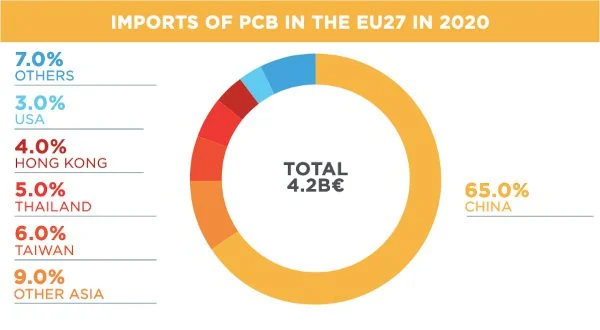The European Parliament officially approved the "EU Chips Act" yesterday, with the legislation adopted with 587 votes to 10, with 38 abstentions. It will now have to be endorsed by the Council of Ministers to become law. The primary objective of this legislation is to quadruple chip production by 2030 and ensure that EU chips account for 20% of the global market share. However, achieving this ambitious goal will require the EU to invest more than €43 billion in public and private funding. To this end, the "EU Chips Act" also mandates that the EU allocate a budget of €3.3 billion for research and development in the field.
However, European support for domestic chip manufacturing ignores the fact the continent has become highly dependent on China to make its PCBs and provide electronic manufacturing services, according to the printed circuit trade body.
Europe’s dependence for electronics manufacturing services may be more diverse but is even more acute, according to a report, Promoting silicon-to-systems manufacturing, prepared by the IPC. A silicon-to-systems, whole-ecosystem approach is needed to support Europe’s goals of strategic autonomy and the “twin transitions” to a greener, more digital economy, the report concludes.
The European Chips Act is welcome but Europe should not focus only on semiconductors, according to the report. The reports states that PCB manufacturing and assembly and electronic manufacturing services in Europe have been in steep decline for decades.
IPC, formerly the Institute of Printed Circuits, is a global trade association for the electronics manufacturing industry. IPC has 3,100 company members drawn from across all sectors of the electronics industry, including design, printed circuit board (PCB) manufacturing, electronic assembly, and advanced packaging.
Support the whole chain
IPC has produced a report that highlights the need to support the whole supply chain, which is only as strong as its weakest link. The report follows one produced 18 months ago lobbying for support for the US PCB industry (see Calls to support US PCB industry).
“The near singular focus” on the semiconductor industry “has obscured critically important segments of the electronics ecosystem,” specifically PCBs and electronic assembly (EMS), without which semiconductors cannot function, the report says.
Over the last 20 years, the European PCB sector experienced a steep decline, the report says, shrinking from approximately 20 to 30 percent of global production to just 2.3 percent in 2021. At the same time Europe has become “highly dependent on China,” the report asserts.
In 2020 Europe imported more PCBs from China than were made domestically. That year European PCB manufacturing was worth €2 billion while Europe imported €4.2 billion of PCBs, of which 65 percent – or €2.73 billion – came from China.

European Union PCB imports were more than twice domestic manufacture in 2020 with 75 percent coming from Greater China. Source: IPC.
The reports adds that the domestic EMS sector has grown in recent years, fueled by factory investment by large global companies and also by the growth of the downstream markets the sector serves, including automotive, industrial, aerospace, defense, and healthcare. However, the European Union imports roughly 90 percent of its required EMS products and services.
“Revitalizing and growing the PCB and EMS segments is essential to building a robust European electronics manufacturing ecosystem, which in turn is essential to ensuring supply chain resiliency, advancing the twin transitions, and promoting European innovation,” said Sanjay Huprikar, president of European operations. “It takes all elements in the supply chain – from silicon to systems – to successfully produce the electronics we all depend on in so many ways.”
The European Commission is aware of the issues IPC said. It pointed out that on June 23, the European Commission’s Directorate General for Internal Market, Industry, Entrepreneurship and SMEs (DG GROW) hosted a meeting on electronics assembly and printed circuit board manufacturing with key industry stakeholders, including companies from the renewable energy, aerospace/defense, automotive, and industrial sectors.
The dialogue was called following an IPC meeting in April that brought together leaders of government and industry to press for an EU strategy to strengthen silicon-to-systems innovation and manufacturing.
+86 191 9627 2716
+86 181 7379 0595
8:30 a.m. to 5:30 p.m., Monday to Friday
